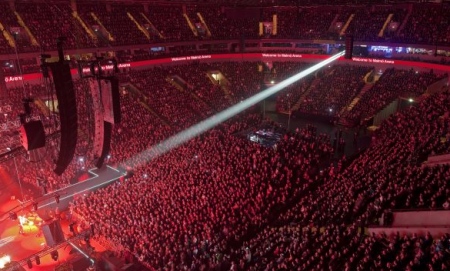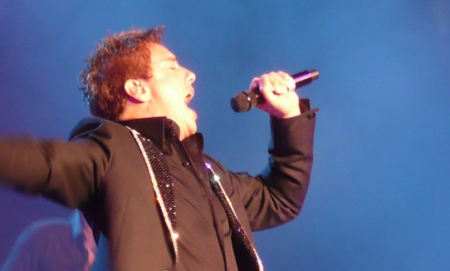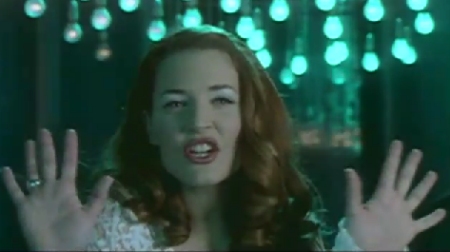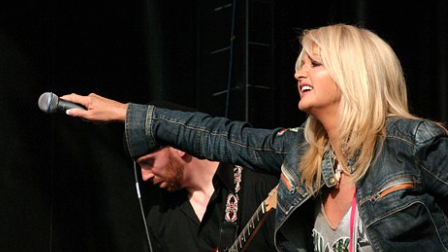As always at this time of year, speculation is mounting in the United Kingdom (and indeed farther afield in the wider Eurovision fan community) as to what’s going on in the deep and dark recesses of Broadcasting House concerning Britain’s Eurovision entry for Copenhagen.
Rumours (as always) are aplenty and the ‘twittersphere’ and ‘facebookiverse’ are awash with speculation, some of it ludicrously risible. Everything from a direct invitation to Jessie J or Geri Halliwell; to Olly Murs singing a Gary Barlow song; to a made-for-Eurovision heavy metal rock group; to the return to a national final are all being discussed.
Frustratingly for all the speculators, the BBC’s lips remain firmly sealed, even if the loose lips of Rylan are in overdrive.
17 New Heads and 14 New Handles
One thing that would at least appear to be true is that there will be something of a different approach this year. This is indicated by the arrival of a new broom in the form of Mr. Guy Freeman, returning to the BBC to helm the UK’s team for Denmark. Freeman has been closely associated with the contest in the past, producing the 1998 show in Birmingham and being the driving force behind the ‘Great British Song Contest’ that chose the British song for Eurovision from 1996 through to 1999.
Without appearing derogatory, it is in fact an old broom the BBC is using for 2014. That may however be a very good move.
Something went seriously awry for the UK’s fortunes in the Eurovision Song Contest and it would take a far more detailed and complex study than this article allows in order to pin-point all that may have contributed to that downturn. Certainly the free language rule introduced in 1999 is a strong factor, as was the expansion of the contest in the mid 1990’s. The UK attitude to the contest from the 1980’s onwards is surely partly to blame, but put simply, the recent UK entries to the contest just haven’t been very good. There, I said it. Or rather, I wrote it, to be pedantic.
So what should the UK fans realistically hope for in 2014? As the hopes and dreams build up that Mr. Freeman does intend to revive a televised selection process format for Copenhagen, there will be a section of British Eurovisionistas who will rejoice at that news. Those that avidly follow the various Scandinavian national finals have openly opined for the BBC to adopt the stadium-based Melodifestivalen format used in Sweden, Norway and Denmark for a long time.

Can you imagine the UK selling out an Arena like Malmo for a UK National Final…
The reality is that introducing a decades-old format that has been the pride of the Scandinavian music scene and television schedule to the British TV audience, is unlikely (highly unlikely actually) to register with the UK viewers. Talent shows are aplenty across all British broadcast channels, but new music is an area that is rarely explored on British television. Whereas viewers will flock to watch new talent performing songs made famous by far more illustrious artists (although ratings for those shows are dropping rapidly with the BBC’s flagship talent show ‘The Voice’ struggling particularly), history has proven that the public have precious little interest in watching wannabes sing songs they’ve never heard of before.
In a way, that’s where Mr Freeman came in and indeed exited stage left.
…Send Us Your Vote On A Postcard Or Stuck Down Envelope
By far the most successful and popular UK format for choosing their song for Europe was, er, the ‘Song for Europe’ competition run from 1964 to 1975. The BBC picked one household name to represent the British music industry, which in turn fell over themselves to submit songs for the artist’s consideration. Who wouldn’t want their latest track performed on prime TV in front of millions of viewers by a major TV or recording star (preferably both) even if ultimately the viewers didn’t send it on to the Eurovision final? I know I would.
This format (including its three year revival from 92 to 94) successfully provided Britain with 13 top four finishes in the Contest, including two wins and eight second places. In addition, all but four of the songs that won the competition were top 20 hit singles. Not a bad strike rate at all.
It was also incorporated into existing BBC television shows, resulting in minimal programme budget impact.

Singer? Check. BBC name? Check. Ratings winner? Discuss (Paula Funnell / Flickr)
The format that preceded and indeed followed this highly successful period for Britain was only marginally less successful. Allowing the writers to choose their own singers, the hits weren’t quite as strong, but the results saw the United Kingdom generally in the upper reaches of the scoreboard more often than not and two further victories were scored at the Contest. There were some fairly bad results – relatively speaking – but it was more that the UK viewers were simply disengaging with the show that brought about many rethinks and reinventions of the selection format from the BBC.
Ultimately, the ‘Song for Europe’ brand became somewhat tarnished, in large part thanks to the way it was presented by the BBC’s Eurovision star turn and when the 1994 show fell to a shameful three million viewers, a rethink was needed. The 1995 relaunch brought a more respectable audience figure and put the UK entry back in the singles top ten for the first time in over a decade, but zero improvement followed at the contest itself.
It Was Like The Great British Bake-Off, But For Music
So enter Mr. Freeman and his new broom. Out went ‘A Song for Europe’ and in came ‘The Great British Song Contest’. Apart from the name change, there was little difference in the actual show, apart from the elimination of half the songs before the televised final. At least in year one. Year two onwards saw the wholesale deconstruction of the established broadcast format, with a return to ‘previews’ of the songs over weeks of prime time Saturday night viewing.
Alas, rather than culminating in a prime time Saturday night final, edited repeats of the performers were casually reconstructed in a dead Sunday afternoon spot. The fans were apoplectic. Alas for them, the audience figures actually – slightly – improved. From woeful to simply worrying. Fair cop to the BBC, though; the format was weak, but they did win the contest once more and created an absolute rarity in finding a song that did badly in Eurovision (if 8th is now considered bad) but stormed the charts all over the world.

The UK fans would kill for a result like Gina G in Copenhagen
‘The Great British Song Contest’ never really caught on, despite providing the UK with some very respectful results and hits and in 2000 Guy Freeman was gone and ‘A Song for Europe’ was back, albeit copying the format established in 1997. Eventually the UK scored the ultimate Eurovision humiliation of last place with “nul points” and some steps were taken to improve the British fortunes and improve the selection process.
All that really happened was that the show was given a new name (‘Eurovision: Making Your Mind Up’), moved back to a Saturday night and was better promoted. Otherwise it was the same format and largely the same show. Viewers interest picked up at first, but was soon in decline and finally, the BBC called time. Although there were talent shows created in 2010 and 2011 to find a singer for a pre-determined song, Britain’s song for Eurovision has been a back room decision ever since.
One Step Out Of Time
So is there any point in reviving the national final format in a country that for decades has had precious little interest in a national final stretching back for over thirty years? Probably not. Not in terms of ratings anyway.
I suspect viewers would be engaged by seeing Engelbert Humperdinck or Bonnie Tyler performing a few tracks from their new albums as part of another show (‘The One Show’ springs to mind) and then being asked to choose the one they like best, but I doubt they’d tune in in particularly high numbers for a stand-alone programme.
If Blue, Engelbert Humperdinck and Bonnie Tyler were competing against each other for the right to represent Britain, then I bet the viewing figures would be huge. And that’s the problem. It’s virtually guaranteed that stars (even forgotten stars from decades earlier) would never agree to compete against each other. We’d be back to amateur night, with names nobody has ever heard of.

Does it matter if nobody votes for the UK, when the UK viewers enjoy the stars taking part?
Had the BBC invited Ms Tyler to compete in an open contest against other singers, I suspect the conversation would have been very, very brief. If the BBC ever consider a revival of the UK national final selection, it could never be as star studded as Melodifestivalen, which is what the UK Eurovisionistas are praying for. It’s likely to be from unknown acts looking for a break in the world of UK entertainment. Even if they went on to win Eurovision (or at the very least gain a respectable result and a hit single) I doubt we’d be hearing from them ever again. I’m thinking Javine, Jade, Josh. I’m also thinking Jemini, but trying not to.
Viewers Count, Not Votes
In terms of Eurovision success, the current British approach isn’t working. The fans are angry. Alas, the part they seem not to understand is that the BBC no longer invests in a show nobody watches, in order to boost the ratings for one of their biggest entertainment shows across their channels. Choosing Blue, Engelbert and Bonnie internally drew back the flagging Eurovision audience in droves. Millions of droves. An extra four million watched Blue finish 11th than saw Josh Dubovie finish last.
Ratings have remained consistently higher, even if the results aren’t good and the hits aren’t flowing. Viewers clearly want to see a star name on the stage, even if they’ve little interest in what they’re singing. The BBC’s first duty is to provide a show for the UK audience that the UK audience wants to watch and enjoys. Pleasing Eurovision fans is not their priority and never should be. If Mr. Freeman is planning on staging a national final, I suspect the delighted fans won’t like the outcome and it will be a huge surprise if the casual viewers tune in. We can but hope, of course, but my gut says it’s a non-starter.
If however, Mr. Freeman and his team really have been chatting for months with Geri Halliwell, Olly Murs, Jessie J, Boyzone and/or Gary Barlow, then I can’t imagine anyone complaining if the answer from any of them is “yes”. If in fact his invitation has extended only as far as Anita Harris, Su Pollard or Cilla Black – far more likely scenarios based on the last couple of years – then I totally sympathize with the disappointment and indeed angry reaction from UK fans that will inevitably follow.
If the BBC get the ten million viewers they want on May 10 with Dame Vera Lynn singing in Copenhagen, then we’ll just have to admit they know what they want and how to go about getting it… even if the UK are at the bottom of the scoreboard once again.
A nation waits.








Any recording artist with even a prayer of a real music career would be out of their minds to hand themselves over to the BBC.
A UK Eurovision entry earns themselves a domestic audience that ranges from apathetic to openly hostile, a support team with a horrendous track record (just ask Josh Dubovie), and a spot on the BBC’s own “Wall of Shame” for the rest of eternity. Gee, sign me up now!
The desperate (Blue) and the bulletproof (Engelbert, Bonnie) – these are the only two choices the BBC has left. The format isn’t the problem. It’s the talent pool.
Eventually some current-ish act is going to take the plunge (probably after a huge wad of license fee money is passed to them under the table), they’ll come in 7th (because they were just too fabulous to properly prepare for their performance and ended up making a fool of themselves) and we’ll be right back where we started.
Pessimistic? Yup. But until the BBC figures out how to make the ESC a good, respectable career move for their representative, this is what you’re going to get. Laurie London singing “This Time For Sure”.
I may sound a bit condescending, and if so, I apologize, it’s not my intention – but the UK might profit from taking a page out of my home country’s book. Germany had similar results to yours in the 2000’s (nothing as spectacularly misfired as Jemini, perhaps, but one last place and one joint last in ’05 and ’08, respectively, are nothing to write home about) – and then a big name on German TV took it upon himself to start an audience-guided talent search that resulted in “Satellite”. And we know how that turned out.
Germany’s fortunes only fizzled out last year when we changed up the formula – ironically, to a more Melodifestivalen-like approach. And yet, this year, we have the most successful German-language band of the last five years – Unheilig – among our hopefuls for Copenhagen, despite the less-than-stellar result of Cascada in Malmö.
I don’t know whether this approach, or a similar one, would work for the UK, but if there’s anything to take away from it, it’s this: Take heart. Bad results for the Big Five are not a law of nature – see also: Italy.
Is it really the known artists that drives up viewers? Can’t it be the expectations of a success? (As reported by BBC and papers)
New searched for and found talent like Lena could work, but time is running out…
But I do not think an older previous star would work again…
Would a younger artist with some UK chart success dare? Probably not, a success on UK chart is a better base for world/Europe success than Eurovision.
What is left? A younger artist with a great song that wants into UK/Europe market. The letter from BBC(?) rejecting UKR talks about ‘instant appeal’ and ‘memorable hooks’. If this is the criteria there is still hope!
An idea I suggested a while ago that may slightly detract from the idea of big British stars competing against one another is to turn a potential UK national final, a Great British Song Contest, so to speak, into a unique format that takes its title literally, and mimics the environment of the British Music Industry. A competition between well known songwriters and producers.
If they’re not already celebrities, then once you give them X Factor style apocalyptic introductions showing the TV audience what trendy noises they’ve been responsible for as well as a pre-recorded bit of fighting talk and some footage of them at a mixing console, the audience associates them with the stars they’ve written for, and the talent performing their songs are simply their protogeés.
Sure, we get to know them too, but much like X Factor and The Voice, people tune in for the coaches. Why not just rope in some songwriters and producers, famous or just successful, and just get them to do what they do every day! The show would also follow the process of finding the singers, as Your Country Needs You did for a week or two in 2009, the writing and development of the song each person is going to sing, and if you really want to modernise it, have the UK audience vote with their wallet. Whoever sells the most copies of their single goes to Eurovision.
It’s workable, and fresh, I think. Any thoughts?
i agree with Ospero totally. its time the BBC changed its attitude. if the song is good and the singer performs well, the UK can win. the article was factual but written by a ‘fan’ so i found it a bit biased but as he goes to eurovision every year i guess he must get an insight into what should be done! Now Terry Wogan has gone it is only a matter of time until the ‘joke’ he made of the contest is forgotten. Then we can get on with winning again!!!
The BBC should ,first, take ESC seriously and than they can choose a format/song/singer that suit them in order to get a good result(not necessarily winning, but one that will take them regularly to the top 10).
At the moment it doesn’t seems that the BBC take the contest that serious, hence poor results.
The last time the BBC took the contest seriously was in 2009, when the UK finished 5th, with an unknown singer but with a credible song writer.
Sometimes national final works(see Sweden,Denmark,Estonia),some time it doesn’t(a lot of countries in Europe).
Sometime an internal selection works(see The Netherlands in 2013, Israel-sometime)and sometime it doesn’t(again a lot of countries in Europe)
Shai, the BBC do take the Contest seriously, it’s just that the measurement the BBC use is not their placing in the final table, but on the UK ratings on the Saturday night. As for the 2009 performance, it’s worth noting that the majority of ‘external to the UK’ PR was paid for by the record label and parties other than the BBC.
The question is if the BBC want to win the Contest in addition to getting 10 million viewers on May 10th 2014.
Ewan,
That’s a big question.Does the BBC want to win?
Somehow it seems they are satisfied with the rating views but not making an effort enough to win the contest.
The Beeb’s job is to provide popular (and ‘quality’) programming to the public that it serves.
Whether “winning” has any relevance is not for the BBC to dictate — It depends on what the viewers want to watch.
Good prospects for a win would likely improve ratings for the Saturday night, but not necessarily enough to justify a more elaborate or indulgent selection process. Right now, ready-made drawcards are more economical.
If the BBC considers ESC a good long term investment, then they’ll want to bootstrap a positive feedback loop. The best strategy might very well be to maintain limited focus on Saturday night ratings until public interest attracts more artists and eventually justifies additional programming for public participation, acheiving better scores along the way.
The public (or the money) has to care enough to apply some pressure. Maybe they prefer to mock and moan after the fact.
Zolan, eloquently put, and I would agree. All I would add is that some focus on the media’s perception of the Contest alongside public interest would serve them well in the long term. Entertain, yes, but Educate and Inform should be in there as well.
Ah yes, “Educate and Inform” were the words I was looking for when I settled on “quality.”
Abuse and ridicule provide cheap and easy material that remains popular as long as it flatters existing attitudes. Re-opening the narrative to other perspectives is certainly something to hope for from a public broadcaster.
The BBC has a role in reminding people how to take a richer interest in things, and ESC is no exception.
Interesting to see how the ratings for the BBC1 coverage over the last decade featuring a well-known, household name (albeit sometimes a long forgotten one) compare with those when the UK is represented by a wannabe who nobody has ever heard of, even if they are selected through a televised process by the viewers.
2013 Bonnie Tyler – 7.83 million, ranked #1 on BBC1
2012 Engelbert Humperdinck – 7.59m #2
2011 Blue – 9.68m #1
2010 Josh Dubovie – 5.59m #7
2009 Jade Ewen & Andrew Lloyd Webber – 7.91m #5
2008 Andy Abraham – 7.15m #3
2007 Scooch – 8.77m #3
2006 Daz Sampson – 8.33 #5
2005 Javine – 7.97m #5
2004 James Fox – 8.38m #5
It’s pretty clear, that the better known the artist, the higher the audience & the higher up the BBC1 chart the show rises. Seems that the UK audience don’t really care what song is selected, but they want to feel they know the artist singing.
Source: BARB https://www.barb.co.uk/viewing/weekly-top-30?